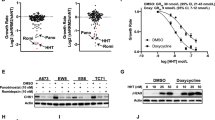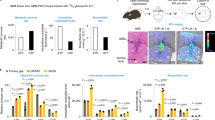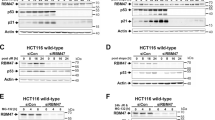Abstract
Several oncogenic proteins and tumour suppressors target the RNA polymerase I and interfere with rRNA synthesis. Here, we show that the glycogen synthase kinase (GSK) 3β, which phosphorylates the tumour suppressor PTEN (phosphatase and tensin homologue deleted on chromosome 10), is selectively enriched in nucleoli of RAS-transformed cells. Immunoprecipitation and chromatin immunoprecipitation assays performed on epithelial and endothelial cells transformed with oncogenic RAS show that GSK3β and PTEN are part of the same complex and associate with promoter and coding region of the rDNA. An active GSK3β mutant abolished nucleolar BrUTP incorporation and associated with the member of the selectivity factor 1 complex TAFI110. Finally, GSK3β inhibition upregulated 45S, 18S and 28S rRNA synthesis in RAS-transformed epithelial cells as revealed by semiquantitative real-time PCR and promoted cellular proliferation. Our results underscore a repressive function for GSK3β in rRNA biogenesis supporting its role as a tumour supressor.
This is a preview of subscription content, access via your institution
Access options
Subscribe to this journal
Receive 50 print issues and online access
$259.00 per year
only $5.18 per issue
Buy this article
- Purchase on Springer Link
- Instant access to full article PDF
Prices may be subject to local taxes which are calculated during checkout




Similar content being viewed by others
References
Al-Khouri AM, Ma Y, Togo SH, Williams S, Mustelin T . (2005). Cooperative phosphorylation of the tumour suppressor phopsphatase and tensin homologue (PTEN) by casein kinases and glycogen synthase kinase 3β. J Biol Chem 280: 35195–35196.
Arbiser JL, Moses MA, Fernandez CA, Ghiso N, Cao Y, Klauber N et al. (1997). Oncogenic H-ras stimulates tumor angiogenesis by two distinct pathways. Proc Natl Acad Sci USA 94: 861–866.
Bachelder RE, Yoon SO, Franci C, de Herreros AG, Mercurio AM . (2005). Glycogen synthase kinase-3 is an endogenous inhibitor of Snail transcription: implications for the epithelial-mesenchymal transition. J Cell Biol 168: 29–33.
Baker SJ . (2007). PTEN enters the nuclear age. Cell 128: 25–28.
Bijur GN, Jope RS . (2003). Glycogen synthase kinase 3β is highly activated in nuclei and mitochondria. Neurochemistry 14: 2415–2419.
Chu EC, Tarnawski AS . (2004). PTEN regulatory functions in tumor suppression and cell biology. Med Sci Monit 10: RA235–RA241.
Di Cristofano A, Pesce B, Cordon-Cardo C, Pandolfi PP . (1998). PTEN is essential for embryonic development and tumor suppression. Nat Gen 19: 348–355.
Dominguez I, Itoh K, Sokol SY . (1995). Role of glycogen synthase kinase 3 beta as a negative regulator of dorsoventral axis formation in Xenopus embryos. Proc Natl Acad Sci USA 92: 8498–8502.
Grummt I . (2003). Life on a planet of its own: regulation of RNA polymerase I transcription in the nucleolus. Genes Dev 17: 1691–1702.
Janda E, Lehman K, Killish I, Jechlinger M, Herzig M, Downward J et al. (2002). Ras and TGF[beta] cooperatively regulate epithelial cell plasticity and metastasis: dissection of Ras signaling pathways. J Cell Biol 156: 299–313.
Jope RS, Johnson GVW . (2004). The glamour and gloom of glycogen synthase-3. Trends Biochem Sci 29: 95–102.
Leslie NR, Downes CP . (2004). PTEN function: how normal cells control it and tumor cells lose it. Biochem J 382: 1–11.
Ma C, Wang J, Gao Y, Gao TW, Chen G, Bower KA et al. (2007). The role of glycogen synthase kinase 3beta in the transformation of epidermal cells. Cancer Res 67: 7756–7764.
Mayer C, Grummt I . (2004). Cellular stress and nucleolar function. Cell Cycle 4: 1036–1038.
Meijer L, Skaltsounis AL, Magiatis P, Polychronopoulos P, Knockaert M, Leost M et al. (2006). GSK-3-selective inhibitors derived from tyrian purple indirubins. Chem Biol 10: 1255–1266.
Morisco C, Zebrowski D, Condorelli G, Tsichlis P, Vatner SF, Sadoshima J . (2000). The Akt-glycogen synthase kinase 3beta pathway regulates transcription of atrial natriuretic factor induced by beta-adrenergic receptor stimulation in cardiac myocytes. J Biol Chem 275: 14466–14475.
Percipalle P, Fomproix N, Cavellan E, Voit R, Reimer G, Kruger T et al. (2006). The chromatin remodelling complex WSTF-SNF2h interacts with nuclear myosin 1 and has a role in RNA polymerase I transcription. EMBO rep 7: 525–530.
Salas TR, Reddy SA, Clifford JL, Davis RJ, Kikuchi A, Lippman SM et al. (2003). Alleviating the suppression of glycogen synthase kinase 3β by Akt leads to the phosphorylation of cAMP-response element-binding protein and its transactivation in intact cell nuclei. J Biol Chem 278: 41338–41346.
Savino TM, Bastos R, Jansen E, Hernandez-Verdun D . (1999). The nucleolar antigen Nop52, the human homologue of the yeast ribosomal RNA processing RRP1, is recruited at late stages of nucleologenesis. J Cell Sci 112: 1889–1900.
Seither P, Grummt I . (1996). Molecular cloning of RPA2, the gene encoding the second largest subunit of mouse RNA polymerase I. Genomics 3: 135–139.
Torres J, Pulido R . (2001). The tumour suppressor PTEN is phosphorylated by the protein kinase CKII at its C-terminus. Implications for PTEN stability to proteasome-mediated degradation. J Biol Chem 276: 993–998..
Tseng A-S, Engel FB, Keating MT . (2006). The GSK-3 inhibitor BIO promotes proliferation in mammalian cardiomyocytes. Chem Biol 13: 957–963.
Wang Q, Zhou Y, Wang X, Evers BM . (2006). Glycogen synthase kinase 3 is a negative regulator of extracellular signal-regulated kinase. Oncogene 25: 43–50.
White RJ . (2005). RNA polymerases I and III growth control and cancer. Nat Rev Mol Cell Biol 6: 69–78.
Zhang C, Comai L, Johnson DL . (2005). PTEN Represses RNA polymerase I transcription by disrupting the SL1 complex. Mol Cell Biol 25: 6899–6911.
Acknowledgements
We thank J Arbiser (Emory University, USA) and H Beug (Institute of Molecular Pathology, Vienna) for providing EpRAS and SVR cells. This work was supported by grants from the Swedish Research Council (Vetenskapsrådet), Cancerfonden, the Lars Hiertas Minne Foundation and the Jeansson Foundation to PP.
Author information
Authors and Affiliations
Corresponding author
Additional information
Supplementary Information accompanies the paper on the Oncogene website (http://www.nature.com/onc).
Rights and permissions
About this article
Cite this article
Vincent, T., Kukalev, A., Andäng, M. et al. The glycogen synthase kinase (GSK) 3β represses RNA polymerase I transcription. Oncogene 27, 5254–5259 (2008). https://doi.org/10.1038/onc.2008.152
Received:
Revised:
Accepted:
Published:
Issue Date:
DOI: https://doi.org/10.1038/onc.2008.152
Keywords
This article is cited by
-
Ribosome biogenesis during cell cycle arrest fuels EMT in development and disease
Nature Communications (2019)
-
Regulation of mitochondrial functions by protein phosphorylation and dephosphorylation
Cell & Bioscience (2016)
-
Glycogen synthase kinase-3β is a crucial mediator of signal-induced RelB degradation
Oncogene (2011)



